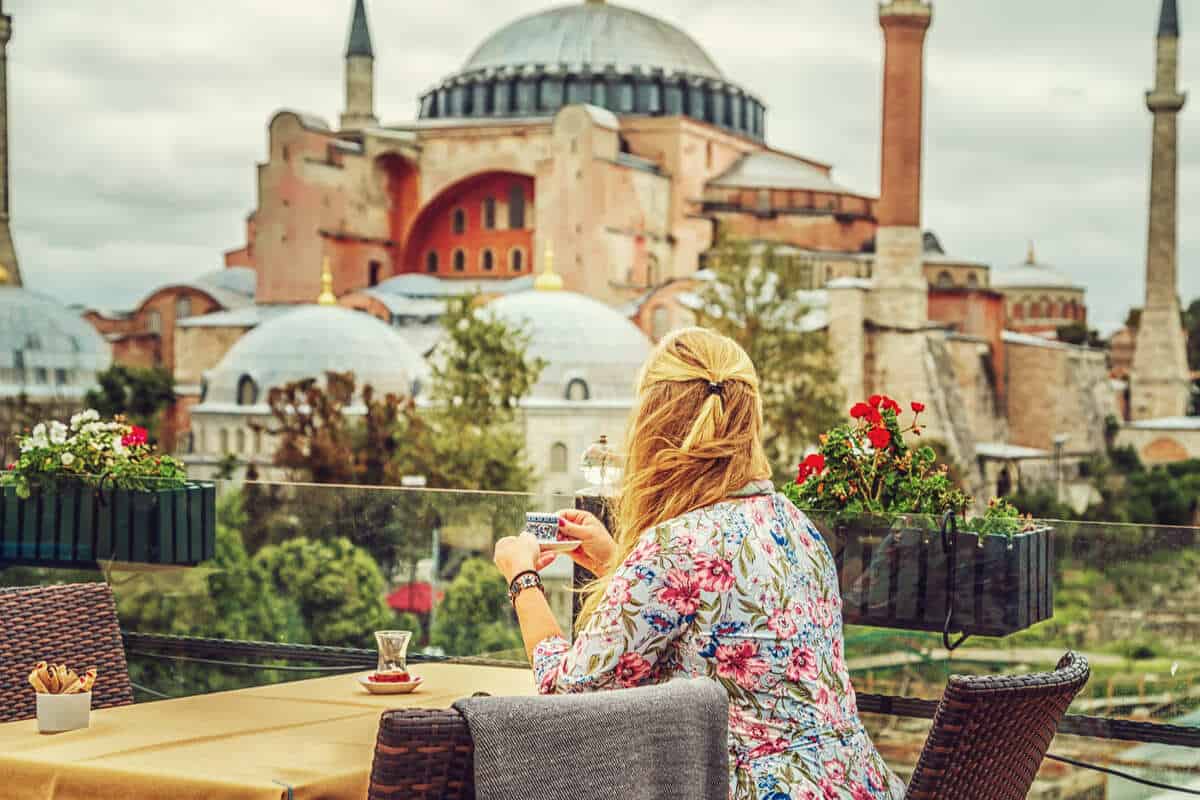With Gen Z’s and millennials’ newfound hunger for exploring the world, and even boomers taking their chances at backpacking while leaving their unadventurous partners at home, solo travel has been experiencing a resurgence like no other.
There’s no beating that rush you get when you land alone in a brand new destination, or when you curate an itinerary that satisfies you and you alone, or the treat that is taking yourself out for dinner to sample new flavors you’d have a hard time finding the words to describe.
To our fellow solo explorers out there, the world is indeed your oyster, but there’s no more fascinating, tourist-friendly, cheaper city than Istanbul:
A Cross-Continental Behemoth

The largest city in Türkiye (formerly spelled Turkey), Istanbul is a sprawling metropolis that over 15 million people call home.
It is so vast that it branches out not into one but two continents: Europe and Asia.
It straddles the Bosphorus Strait, the natural sea border between them, but the ship-busy watercourse is no barrier for the cross-continental behemoth: there are pedestrian and car bridges, underwater trains, and hourly ferries linking both sides.

This means you can eat your lunch in Europe and have dinner in Asia, without ever leaving the same city – how cool is that? – but Istanbul’s boundless wonders do not stop there: this is one of Eurasia’s most culturally-charged spots, and an Ancient Queen over 2,000 years old.
It was once the capital of the Byzantine (Eastern Roman) Empire before it was claimed by the Ottoman Empire, and its diverse cityscape is a testament to its multicultural character: from Roman ruins to majestic oriental mosques to European-style architecture, you’ll find it all here.
One Of The Most Affordable Metropolises In The World

Istanbul should be a bucket list item for all, but solo travelers in particular: for a metropolis that sits alongside New York, Tokyo, and London as one of the most vibrant in the world, it sure as hell is affordable.
We know traveling solo and bearing all expenses alone can be hard on the wallet, especially when you’re young and on a shoestring budget, but trust us, Istanbul is the last place where you’ll be counting pennies when picking accommodation or deciding where to go for dinner.

The Turkish lira—Türkiye’s currency—is much weaker not only against the U.S. dollar but nearly every other major currency globally. This means a solo traveler’s hard-earned money will stretch much further in Istanbul than in their home country, even when inflation is factored in.
How Much Does A Trip To Istanbul Cost?
For instance, if you’re the slow travel Airbnb kind, a one-month stay in Istanbul will only set you back between $377 (for a private room in someone’s home) and $609 for a fully-furnished flat in a residential area, and hotels are not that much expensive, either.

If you’re only visiting for the week, a single room in trendy Beyoglu, a hippy district within walking distance of famous landmarks like Galata Tower and Dolmabahçe Palace is only going to cost you $425 (seven nights), or if you’re really economical, $70 for a shared dorm bed.
Food is remarkably inexpensive, also: remember, this is the birthplace of kebab and pide, and there’s no shortage of takeaway spots where you can order chunky, crispy-meat kebabs sometimes for five bucks or less (not to mention mid-range restaurants).

Istanbul was recently named the best city in the world for foodies, beating Tokyo and Mexico City to the number one spot, and with life-changing gastronomic experiences being at the top of the average solo traveler’s priority list, it’s no wonder they love it so much:
Dining out in a local Istanbul eatery, you should expect to pay $12 to $15, tips excluded, for a three-course meal including a lentil soup, a generously-sized main dish, a simple dessert and a soft drink (alcoholic beverages are more expensive).

You can, of course, splurge on five-star dinners at the iconic Seven Hills Restaurant with views of minaret-dotted Sultanahmet Square, to the tune of $80 to $100 per person, or book yourself a five-star stay in a palatial hotel by the Bosphorus, but the point is, Istanbul is not for the affluent only.
Istanbul Is Safe And Easy To Explore
Other than the culture and affordability, travelers love it for how easy – and safe – it is to explore: this is a megacity stretching from Europe into Asia, but you’d be surprised at the well-connected transportation and commuting infrastructure.

Depending on where you’re based, you’ll be using the metro, trams, ferries, cable cars or the underwater Marmaray, that travels beneath the seabed linking both sides of the city on opposite sides of the continental divide, and most importantly, tickets are cheap.
- A metro ticket costs 17.70 liras ($0.54)
- A tram ticket costs 15 liras ($0.46)
- A Marmaray ticket costs 39.18 liras ($1.21)
- A cross-continental ferry from Karakoy (European side) to Kadikoy (Asian side) costs 56.88 ($1.75)

Additionally, Istanbul is very safe for solo tourists, with low levels of violence observed across all main touristy districts, such as Sultanahmet, Beyoglu, Fenet and Balar, Kadikoy and Nişantaşi.
Their main concern is pickpockets, particularly in crowded areas like Taksim Square and Sultanahmet, and of course, scamming which is widespread in Istanbul – do make sure your taxi has turned on the taximeter before he hits the pedal – but they’re highly unlikely to be harassed or threatened.
This is a major city, after all, so general safety advice applies: maintain a high level of situational awareness in touristy zones, avoid deserted, poorly-lit areas at night, and be cautious when approached by strangers.
Credit: Source link

